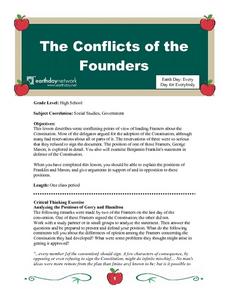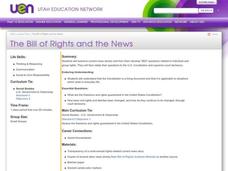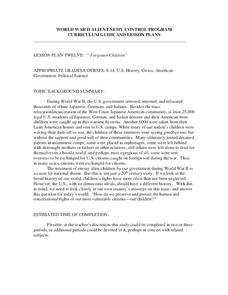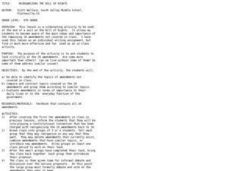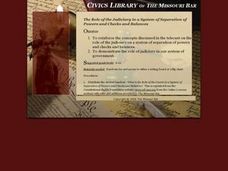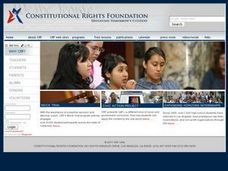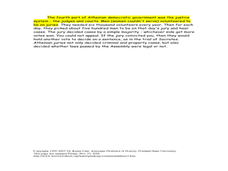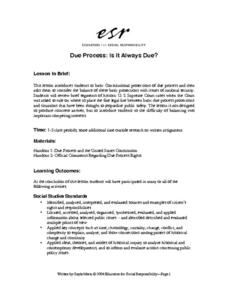Curated OER
What is Meant by Returning to Fundamental Principles?
Students apply the principles and ideas suggested by the Constitution to a contemporary issue or problem, and work through the issue to reach their own conclusions.
Curated OER
The Conficts of the Founders
High schoolers discuss the often conflicting viewpoints of the framers of the Constitution. One Framer in particular, George Mason, strongly objected to the creation of the Constitution. His objections are explored and the Constitutional...
Curated OER
The Bill of Rights and the News
Students examine current news stories and from them develop "BIG" questions related to individual and group rights. They then relate their questions to the U.S. Constitution and supreme court decisions.
Curated OER
"Martial Law in Hawaii After the Attack on Pearl Harbor"
Students explore the concepts of martial law, writ of habeas corpus, due process, discovery and human and constitutional rights during World War II. They assess the roles and responsibilities of government leaders and citizens during...
Curated OER
Justice
Students consider the role of justice in the formation of the United States and in the operation of today's criminal justice system. They investigate symbols associated with justice and references to justice in the Constitution.
Curated OER
World War II Alien Enemy Control Program
Students become familiar with the concepts of human rights and constitutional rights. They have an increased awareness of the historical record as to the cessation of these rights, especially in regards to children during WWII. It is...
Curated OER
Reorganizing the Bill of Rights
Eighth graders look critically at the 26 amendments to the United States Constitution.
Curated OER
Government: Missouri Bar Civics Library
Students visit the Missouri bar Website to examine information about the U.S. Constitution and its Amendments. They complete a variety of activities from the provided lessons including the judiciary, Fourth Amendment issues, civil law,...
Curated OER
Racial Discrimination and the Death Penalty
Available on RTF file. Students study race and its relationship to the death penalty. Students also review court cases and constitutional amendments related to racial discrimination.
Curated OER
What Makes Us Free?: Maine's Declaration of Rights
Young scholars analyze Maine's Declaration of Rights. They review state constitutions and declaration of rights and their importance. They analyze a section of Maine's Declaration of Rights and crete their own declarations of rights....
Curated OER
Foundations of Our Constitution
Students explore documents that serve as the foundation for American democracy. They, use the Foundations of Our Constitution which consist of three components: (1) a reading with discussion questions, (2) an interactive activity, and...
Curated OER
In the Light of Reverence
Students watch a documentary prior to participating in a Supreme Court simulation in order to study how religious practices are protected by the First Amendment of the Constitution. They interpret conflict from a number of perspectives...
Curated OER
Judging Acts
Students research Canada's political history by analyzing the country's constitution. To display their understanding, students write essays.
Curated OER
After the Civil War: Segregation
Students study the Civil War. For this American history lesson, students define segregation, make a segregation collage with pictures of people being separated from others because of their race, religion, or ethnic background, and write...
Curated OER
Declaration of Independence
Students explore the US Constitution. In this Bill of Rights lesson, students work in pairs to select and examine amendments to the Bill of Rights. Students will identify what the amendment means, why they chose it, what it protects, and...
Curated OER
Comparison of Political Ideologies in the Context of Constitutional Preambles
Students examine the various philosophies that form the foundations of political systems of major world countries.
Curated OER
Architecture and Democracy
Fifth graders contrast and compare ancient Greece to the U.S.A. In this Greek History activity, 5th graders investigate the buildings and designs of ancient Greece, as well as their democracy and government. Students answer...
Curated OER
It is Our Right-Don't Waste It!
Students explore the basic rights granted to all American citizens by the U.S. Constitution in the light of women's issues. The women's suffrage movement, the role of Susan B. Anthony, and the timeline of events on voting rights are...
Curated OER
Due Process: Is It Always Due?
Students explore the basic Constitutional protections of due process and then consider the balance of these basic protections with issues of national security. A variety of segments of U.S. Supreme Court cases are examined in this lesson.
Curated OER
Ambivalent Council
Students consider the purpose of a constitution and research Iraq's five major population groups. They write a letter to the Iraqi Governing Council from the perspective of a member of one of these Iraqi population groups.
Curated OER
Working Together As a Team
Students examine the need for rules to keep order at home, in school, in communities, and in the country using trade books and teamwork activities. They work in cooperative groups to define a positive learning community by writing a...
Curated OER
Introduction to "Julius Caesar"
Students discuss American form of government. They read the play Julius Caesar.
Curated OER
Rainforests: What Are They?
Second graders investigate rain forests by reading a habitat checklist. In this environment lesson, 2nd graders read the book The Great Kapok Tree, and discuss what characteristics make up a rain forest. Students explore a...
Curated OER
Due Process
Students explore the concept of due process. In this American law lesson, students view a 9-slide PowerPoint presentation on the topic and then respond to 3 discussion questions about the 5th and 14th amendments.



